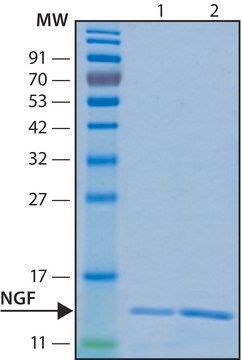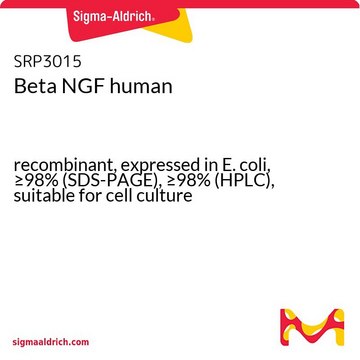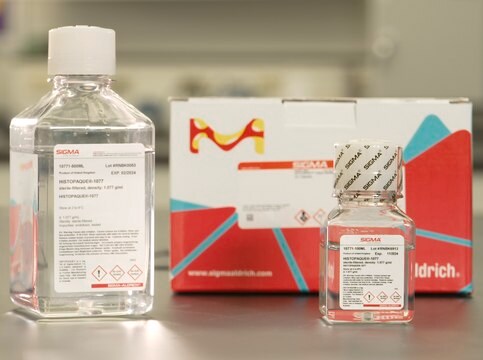N0513
Nerve Growth Factor-7S from murine submaxillary gland
lyophilized powder, suitable for cell culture
Synonym(s):
NGF-7S
Sign Into View Organizational & Contract Pricing
All Photos(1)
About This Item
Recommended Products
Product Name
Nerve Growth Factor-7S from murine submaxillary gland, NGF-7S, lyophilized powder, suitable for cell culture
biological source
mouse
Quality Level
form
lyophilized powder
potency
2-250 ng/mL ED50/EC50
quality
endotoxin tested
mol wt
protein 130 kDa
packaging
pkg of 0.1 mg
technique(s)
cell culture | mammalian: suitable
impurities
≤10
color
white
UniProt accession no.
storage temp.
−20°C
Gene Information
mouse ... Ngf(18049)
General description
Nerve growth factor (NGF) is a dimer of 118-residue polypeptide chains linked non-covalently. Both these polypeptides contain three intramolecular disulphide bridges. It forms the prototype of the neurotrophin growth factor family. In male mouse submandibular salivary gland, NGF is present in high amounts, and is present as a high molecular weight complex called nerve growth factor-7S (NGF-7S). NGF-7S is an α2β2γ2 complex, where β2-NGF is the active neurotrophin, and is linked to the dimers of the glandular kallikrein serine proteinases members, α-NGF and γ-NGF.
Application
Nerve Growth Factor-7S (NGF-7S) from murine submaxillary gland has been used for the treatment of following cells to induce neuronal differentiation-
- PC12
- Dorsal root ganglia (DRG) obtained from chick embryos of either sex (Gallus gallus)
Biochem/physiol Actions
Nerve growth factor (NGF) is a neurotrophin, which facilitates the differentiation and survival of specific subtypes of neurons of central nervous system and peripheral nervous system. However, nerve growth factor-7S (NGF-7S) lacks any neurotrophic activity as most part of β-NGF subunit is buried within the NGF-7S complex.
Physical form
Lyophilized from 0.2 μm filtered solution in 25 mM sodium phosphate, pH 7.0.
Preparation Note
Nerve growth factor-7S (NGF-7S) is isolated from male mouse submaxillary glands using a modification of the method of Varon, et al.
Analysis Note
The biological activity is measured using a 3-day MTT assay.
Storage Class Code
11 - Combustible Solids
WGK
WGK 3
Flash Point(F)
Not applicable
Flash Point(C)
Not applicable
Personal Protective Equipment
dust mask type N95 (US), Eyeshields, Gloves
Choose from one of the most recent versions:
Already Own This Product?
Find documentation for the products that you have recently purchased in the Document Library.
Kun-Shan Huang et al.
Evidence-based complementary and alternative medicine : eCAM, 2011, 109809-109809 (2009-08-19)
The present study provides in vitro and in vivo evaluation of Paeoniae alba Radix (PR) on peripheral nerve regeneration. In the in vitro study, we found the PR caused a marked enhancement of the nerve growth factor-mediated neurite outgrowth from
Hsien-Tung Chen et al.
Journal of biomedical materials research. Part B, Applied biomaterials, 84(1), 256-262 (2007-05-22)
This study provides in vitro and in vivo evaluation of rat serum metabolites of the Pueraria lobata (SMP) on peripheral nerve regeneration. In the in vitro study, we found that the SMP caused a marked enhancement of the nerve growth
B Bax et al.
Structure (London, England : 1993), 5(10), 1275-1285 (1997-11-14)
Nerve growth factor (NGF) is a neurotrophic factor that promotes the differentiation and survival of certain populations of neurons in the central and peripheral nervous systems. 7S NGF is an alpha 2 beta 2 gamma 2 complex in which the
The isolation of the mouse nerve growth factor protein in a high molecular weight form.
S Varon et al.
Biochemistry, 6(7), 2202-2209 (1967-07-01)
Claudia Guldimann et al.
International journal of experimental pathology, 93(4), 259-268 (2012-07-19)
Central nervous system (CNS) infections in ruminant livestock, such as listeriosis, are of major concern for veterinary and public health. To date, no host-specific in vitro models for ruminant CNS infections are available. Here, we established and evaluated the suitability
Our team of scientists has experience in all areas of research including Life Science, Material Science, Chemical Synthesis, Chromatography, Analytical and many others.
Contact Technical Service








